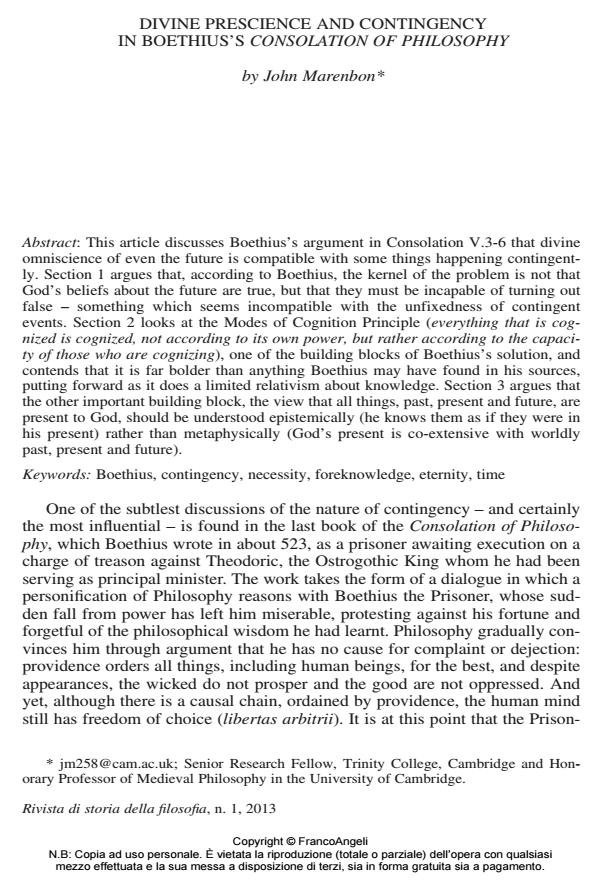Divine prescience and contingency in Boethius’s Consolation of philosophy
Titolo Rivista RIVISTA DI STORIA DELLA FILOSOFIA
Autori/Curatori John Marenbon
Anno di pubblicazione 2013 Fascicolo 2013/1
Lingua Italiano Numero pagine 13 P. 9-21 Dimensione file 482 KB
DOI 10.3280/SF2013-001002
Il DOI è il codice a barre della proprietà intellettuale: per saperne di più
clicca qui
Qui sotto puoi vedere in anteprima la prima pagina di questo articolo.
Se questo articolo ti interessa, lo puoi acquistare (e scaricare in formato pdf) seguendo le facili indicazioni per acquistare il download credit. Acquista Download Credits per scaricare questo Articolo in formato PDF

FrancoAngeli è membro della Publishers International Linking Association, Inc (PILA), associazione indipendente e non profit per facilitare (attraverso i servizi tecnologici implementati da CrossRef.org) l’accesso degli studiosi ai contenuti digitali nelle pubblicazioni professionali e scientifiche.
This article discusses Boethius’s argument in Consolation V.3-6 that divine omniscience of even the future is compatible with some things happening contingently. Section 1 argues that, according to Boethius, the kernel of the problem is not that God’s beliefs about the future are true, but that they must be incapable of turning out false - something which seems incompatible with the unfixedness of contingent events. Section 2 looks at the Modes of Cognition Principle (everything that is cognized is cognized, not according to its own power, but rather according to the capacity of those who are cognizing), one of the building blocks of Boethius’s solution, and contends that it is far bolder than anything Boethius may have found in his sources, putting forward as it does a limited relativism about knowledge. Section 3 argues that the other important building block, the view that all things, past, present and future, are present to God, should be understood epistemically (he knows them as if they were in his present) rather than metaphysically (God’s present is co-extensive with worldly past, present and future).
Parole chiave:Boethius, contingency, necessity, foreknowledge, eternity, time
- Boethian Abolition Seeta Chaganti, in PMLA/Publications of the Modern Language Association of America /2022 pp.144
DOI: 10.1632/S0030812921000870
John Marenbon, Divine prescience and contingency in Boethius’s Consolation of philosophy in "RIVISTA DI STORIA DELLA FILOSOFIA" 1/2013, pp 9-21, DOI: 10.3280/SF2013-001002